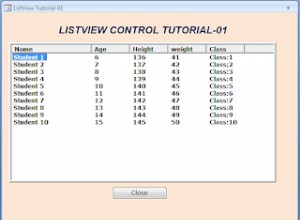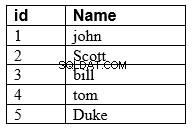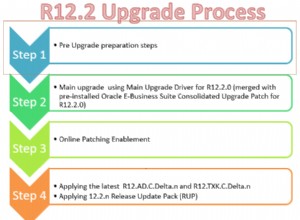MODIFIER :pour éviter les les conditions de concurrence
dans les environnements concurrents, utilisez WITH (UPDLOCK) dans la sous-requête corrélée ou EXCEPT 'd SELECT . Le script de test que j'ai écrit ci-dessous ne l'exige pas, car il utilise des tables temporaires qui ne sont visibles que pour la connexion actuelle, mais dans un environnement réel, fonctionnant sur des tables utilisateur, ce serait nécessaire.
MERGE ne nécessite pas UPDLOCK .
Inspiré par la réponse de mcl concernant :index unique et laisser la base de données lancer une erreur, j'ai décidé de comparer insertions conditionnelles vs essayer/attraper .
Les résultats semblent prendre en charge l'insertion conditionnelle sur try/catch, mais YMMV. C'est un scénario très simple (une colonne, un petit tableau, etc.), exécuté sur une machine, etc.
Voici les résultats (SQL Server 2008, build 10.0.1600.2) :
duplicates (short table)
try/catch: 14440 milliseconds / 100000 inserts
conditional insert: 2983 milliseconds / 100000 inserts
except: 2966 milliseconds / 100000 inserts
merge: 2983 milliseconds / 100000 inserts
uniques
try/catch: 3920 milliseconds / 100000 inserts
conditional insert: 3860 milliseconds / 100000 inserts
except: 3873 milliseconds / 100000 inserts
merge: 3890 milliseconds / 100000 inserts
straight insert: 3173 milliseconds / 100000 inserts
duplicates (tall table)
try/catch: 14436 milliseconds / 100000 inserts
conditional insert: 3063 milliseconds / 100000 inserts
except: 3063 milliseconds / 100000 inserts
merge: 3030 milliseconds / 100000 inserts
Remarquez, même sur des encarts uniques, il y a légèrement plus de frais généraux à essayer/attraper qu'une insertion conditionnelle. Je me demande si cela varie selon la version, le processeur, le nombre de cœurs, etc.
Je n'ai pas comparé le IF insertions conditionnelles, juste WHERE . Je suppose que le IF variété montrerait plus de surcharge, car a) auriez-vous deux instructions, et b) vous auriez besoin d'envelopper les deux instructions dans une transaction et de définir le niveau d'isolement sur sérialisable (!). Si quelqu'un voulait pour tester cela, vous devez remplacer la table temporaire par une table utilisateur normale (sérialisable ne s'applique pas aux tables temporaires locales).
Voici le script :
-- tested on SQL 2008.
-- to run on SQL 2005, comment out the statements using MERGE
set nocount on
if object_id('tempdb..#temp') is not null drop table #temp
create table #temp (col1 int primary key)
go
-------------------------------------------------------
-- duplicate insert test against a table w/ 1 record
-------------------------------------------------------
insert #temp values (1)
go
declare @x int, @y int, @now datetime, @duration int
select @x = 1, @y = 0, @now = getdate()
while @y < 100000 begin
set @y = @y+1
begin try
insert #temp select @x
end try
begin catch end catch
end
set @duration = datediff(ms,@now,getdate())
raiserror('duplicates (short table), try/catch: %i milliseconds / %i inserts',-1,-1,@duration,@y) with nowait
go
declare @x int, @y int, @now datetime, @duration int
select @x = 1, @y = 0, @now = getdate()
while @y < 100000 begin
set @y = @y+1
insert #temp select @x where not exists (select * from #temp where col1 = @x)
end
set @duration = datediff(ms,@now,getdate())
raiserror('duplicates (short table), conditional insert: %i milliseconds / %i inserts',-1,-1,@duration, @y) with nowait
go
declare @x int, @y int, @now datetime, @duration int
select @x = 1, @y = 0, @now = getdate()
while @y < 100000 begin
set @y = @y+1
insert #temp select @x except select col1 from #temp
end
set @duration = datediff(ms,@now,getdate())
raiserror('duplicates (short table), except: %i milliseconds / %i inserts',-1,-1,@duration, @y) with nowait
go
-- comment this batch out for SQL 2005
declare @x int, @y int, @now datetime, @duration int
select @x = 1, @y = 0, @now = getdate()
while @y < 100000 begin
set @y = @y+1
merge #temp t using (select @x) s (col1) on t.col1 = s.col1 when not matched by target then insert values (col1);
end
set @duration = datediff(ms,@now,getdate())
raiserror('duplicates (short table), merge: %i milliseconds / %i inserts',-1,-1,@duration, @y) with nowait
go
-------------------------------------------------------
-- unique insert test against an initially empty table
-------------------------------------------------------
truncate table #temp
declare @x int, @now datetime, @duration int
select @x = 0, @now = getdate()
while @x < 100000 begin
set @x = @x+1
insert #temp select @x
end
set @duration = datediff(ms,@now,getdate())
raiserror('uniques, straight insert: %i milliseconds / %i inserts',-1,-1,@duration, @x) with nowait
go
truncate table #temp
declare @x int, @now datetime, @duration int
select @x = 0, @now = getdate()
while @x < 100000 begin
set @x = @x+1
begin try
insert #temp select @x
end try
begin catch end catch
end
set @duration = datediff(ms,@now,getdate())
raiserror('uniques, try/catch: %i milliseconds / %i inserts',-1,-1,@duration, @x) with nowait
go
truncate table #temp
declare @x int, @now datetime, @duration int
select @x = 0, @now = getdate()
while @x < 100000 begin
set @x = @x+1
insert #temp select @x where not exists (select * from #temp where col1 = @x)
end
set @duration = datediff(ms,@now,getdate())
raiserror('uniques, conditional insert: %i milliseconds / %i inserts',-1,-1,@duration, @x) with nowait
go
truncate table #temp
declare @x int, @now datetime, @duration int
select @x = 0, @now = getdate()
while @x < 100000 begin
set @x = @x+1
insert #temp select @x except select col1 from #temp
end
set @duration = datediff(ms,@now,getdate())
raiserror('uniques, except: %i milliseconds / %i inserts',-1,-1,@duration, @x) with nowait
go
-- comment this batch out for SQL 2005
truncate table #temp
declare @x int, @now datetime, @duration int
select @x = 1, @now = getdate()
while @x < 100000 begin
set @x = @x+1
merge #temp t using (select @x) s (col1) on t.col1 = s.col1 when not matched by target then insert values (col1);
end
set @duration = datediff(ms,@now,getdate())
raiserror('uniques, merge: %i milliseconds / %i inserts',-1,-1,@duration, @x) with nowait
go
-------------------------------------------------------
-- duplicate insert test against a table w/ 100000 records
-------------------------------------------------------
declare @x int, @y int, @now datetime, @duration int
select @x = 1, @y = 0, @now = getdate()
while @y < 100000 begin
set @y = @y+1
begin try
insert #temp select @x
end try
begin catch end catch
end
set @duration = datediff(ms,@now,getdate())
raiserror('duplicates (tall table), try/catch: %i milliseconds / %i inserts',-1,-1,@duration,@y) with nowait
go
declare @x int, @y int, @now datetime, @duration int
select @x = 1, @y = 0, @now = getdate()
while @y < 100000 begin
set @y = @y+1
insert #temp select @x where not exists (select * from #temp where col1 = @x)
end
set @duration = datediff(ms,@now,getdate())
raiserror('duplicates (tall table), conditional insert: %i milliseconds / %i inserts',-1,-1,@duration, @y) with nowait
go
declare @x int, @y int, @now datetime, @duration int
select @x = 1, @y = 0, @now = getdate()
while @y < 100000 begin
set @y = @y+1
insert #temp select @x except select col1 from #temp
end
set @duration = datediff(ms,@now,getdate())
raiserror('duplicates (tall table), except: %i milliseconds / %i inserts',-1,-1,@duration, @y) with nowait
go
-- comment this batch out for SQL 2005
declare @x int, @y int, @now datetime, @duration int
select @x = 1, @y = 0, @now = getdate()
while @y < 100000 begin
set @y = @y+1
merge #temp t using (select @x) s (col1) on t.col1 = s.col1 when not matched by target then insert values (col1);
end
set @duration = datediff(ms,@now,getdate())
raiserror('duplicates (tall table), merge: %i milliseconds / %i inserts',-1,-1,@duration, @y) with nowait
go




